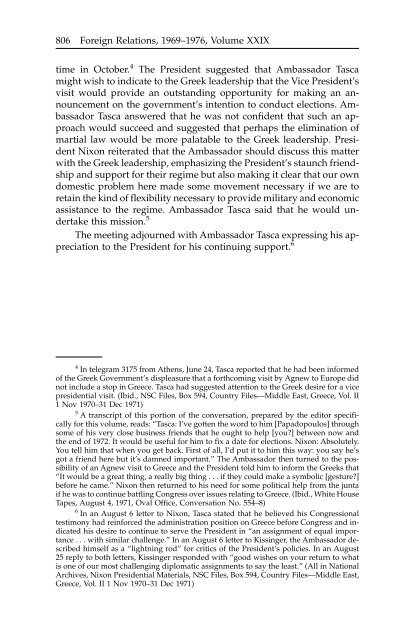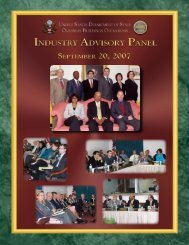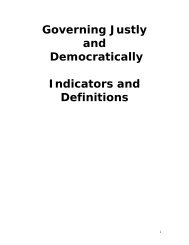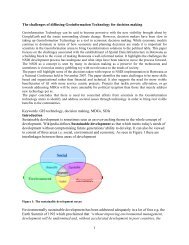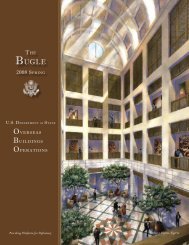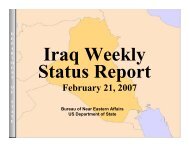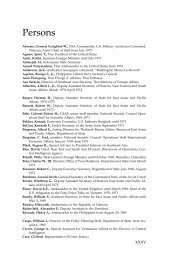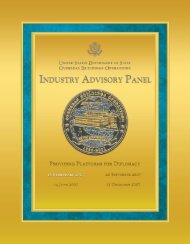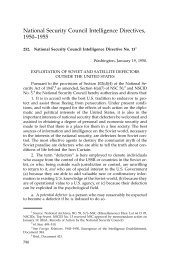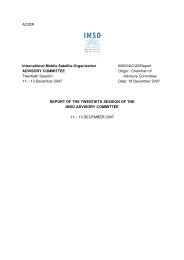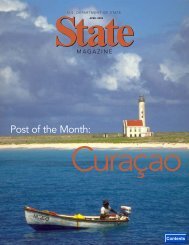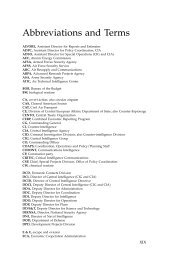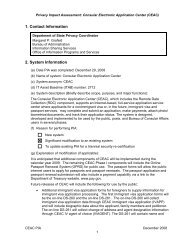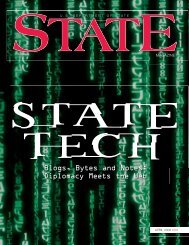Greece - US Department of State
Greece - US Department of State
Greece - US Department of State
Create successful ePaper yourself
Turn your PDF publications into a flip-book with our unique Google optimized e-Paper software.
806 Foreign Relations, 1969–1976, Volume XXIX<br />
time in October. 4 The President suggested that Ambassador Tasca<br />
might wish to indicate to the Greek leadership that the Vice President’s<br />
visit would provide an outstanding opportunity for making an announcement<br />
on the government’s intention to conduct elections. Ambassador<br />
Tasca answered that he was not confident that such an approach<br />
would succeed and suggested that perhaps the elimination <strong>of</strong><br />
martial law would be more palatable to the Greek leadership. President<br />
Nixon reiterated that the Ambassador should discuss this matter<br />
with the Greek leadership, emphasizing the President’s staunch friendship<br />
and support for their regime but also making it clear that our own<br />
domestic problem here made some movement necessary if we are to<br />
retain the kind <strong>of</strong> flexibility necessary to provide military and economic<br />
assistance to the regime. Ambassador Tasca said that he would undertake<br />
this mission. 5<br />
The meeting adjourned with Ambassador Tasca expressing his appreciation<br />
to the President for his continuing support. 6<br />
4 In telegram 3175 from Athens, June 24, Tasca reported that he had been informed<br />
<strong>of</strong> the Greek Government’s displeasure that a forthcoming visit by Agnew to Europe did<br />
not include a stop in <strong>Greece</strong>. Tasca had suggested attention to the Greek desire for a vice<br />
presidential visit. (Ibid., NSC Files, Box 594, Country Files—Middle East, <strong>Greece</strong>, Vol. II<br />
1 Nov 1970–31 Dec 1971)<br />
5 A transcript <strong>of</strong> this portion <strong>of</strong> the conversation, prepared by the editor specifically<br />
for this volume, reads: “Tasca: I’ve gotten the word to him [Papadopoulos] through<br />
some <strong>of</strong> his very close business friends that he ought to help [you?] between now and<br />
the end <strong>of</strong> 1972. It would be useful for him to fix a date for elections. Nixon: Absolutely.<br />
You tell him that when you get back. First <strong>of</strong> all, I’d put it to him this way: you say he’s<br />
got a friend here but it’s damned important.” The Ambassador then turned to the possibility<br />
<strong>of</strong> an Agnew visit to <strong>Greece</strong> and the President told him to inform the Greeks that<br />
“It would be a great thing, a really big thing . . . if they could make a symbolic [gesture?]<br />
before he came.” Nixon then returned to his need for some political help from the junta<br />
if he was to continue battling Congress over issues relating to <strong>Greece</strong>. (Ibid., White House<br />
Tapes, August 4, 1971, Oval Office, Conversation No. 554–8)<br />
6 In an August 6 letter to Nixon, Tasca stated that he believed his Congressional<br />
testimony had reinforced the administration position on <strong>Greece</strong> before Congress and indicated<br />
his desire to continue to serve the President in “an assignment <strong>of</strong> equal importance<br />
. . . with similar challenge.” In an August 6 letter to Kissinger, the Ambassador described<br />
himself as a “lightning rod” for critics <strong>of</strong> the President’s policies. In an August<br />
25 reply to both letters, Kissinger responded with “good wishes on your return to what<br />
is one <strong>of</strong> our most challenging diplomatic assignments to say the least.” (All in National<br />
Archives, Nixon Presidential Materials, NSC Files, Box 594, Country Files—Middle East,<br />
<strong>Greece</strong>, Vol. II 1 Nov 1970–31 Dec 1971)


